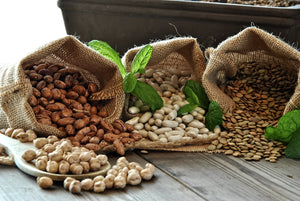Eating for Type 2 Diabetes
Jun 17, 2017
Proper nutrition for type 2 diabetes is a crucial component for managing the disease and feeling your best. While there are individualized needs that come with a diagnosis, the basic nutritional recommendations are beneficial whether you deal with diabetes or not. Eating to steady blood sugar and insulin levels results in better energy, sleep, mood, and mental focus for everyone! Keep your blood sugar in shape with these tips:
Fill Up on Fiber
Choosing foods with higher fiber helps to both lessen and slow the release of carbohydrates entering the blood stream. This makes it easier for your body to steady blood sugar levels promoting better appetite control, improved energy, and concentration. The amount of fiber you need is based on the number of calories you consume. The USDA recommends 14 grams of fiber for every 1,000 calories you eat. Fruits, vegetables, beans, legumes, and whole grains are all great sources of fiber!
Pair with Protein
Protein slows carbohydrate absorption making it easier for your body to manage blood sugar levels. Pairing protein rich foods at meals and snacks will decrease stress on your body, and support its ability to more efficiently process carbohydrates for better blood sugar control.
Go for Low-Glycemic Foods
The Glycemic Index ranks how rapidly blood sugar rises after a food is ingested. Where a food falls on the scale depends on the specific type of carbohydrate it contains. Foods with ratings of 55 or less are low GI foods because they are digested and absorbed more slowly and therefore keep your blood sugar more steady.
Most fruits and vegetables rank low on the GI Index, but some such as grapes and beets fall into the moderate or high category and should be enjoyed in smaller quantities or less often. Whole grains including oats, quinoa, and sprouted grains are great choices because they are naturally rich in fiber and protein so they enter the blood stream more slowly. Beans and legumes such as lentils, kidney beans, and peas are also superior choices.
Eat Early & Often
This is everyone’s favorite recommendation, after all, no one likes to be hangry (hungry & angry)! Eating every couple hours helps to ensure your body has the proper amount of fuel to keep you energized, and also helps prevent episodes of overeating that result in blood sugar spikes and leave us feeling tired and irritable. Keeping snacks that contain quality carbohydrates along with protein available supports stable blood sugar and keeps you feeling your best!
Author:
Sarah Mattison Berndt, MS, RD, CD
Owner Fit Fresh Cuisine & Hybrid Athletic Club
www.fitfreshcuisine.com
www.hybridathleticclub.com


